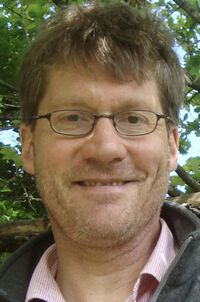CAZypedia celebrates the life of Senior Curator Emeritus Harry Gilbert, a true giant in the field, who passed away in September 2025.
CAZypedia needs your help!
We have many unassigned pages in need of Authors and Responsible Curators. See a page that's out-of-date and just needs a touch-up? - You are also welcome to become a CAZypedian. Here's how.
Scientists at all career stages, including students, are welcome to contribute.
Learn more about CAZypedia's misson here and in this article. Totally new to the CAZy classification? Read this first.
Difference between revisions of "User:Christoph Mayer"
| Line 1: | Line 1: | ||
[[File:Cazy_Mayer.jpg|200px|right]] | [[File:Cazy_Mayer.jpg|200px|right]] | ||
| − | '''Christoph Mayer | + | '''This is the user page of Christoph Mayer, professor at the University of Tübingen''' He obtained his diploma in chemistry from the University of Freiburg i. Br., Germany and he achieved his PhD in Microbiology under supervision |
of Dora M. Rast from the University of Zürich, Switzerland. With a postdoc fellowship awarded by the Swiss National Science Foundation (SNF) he moved to | of Dora M. Rast from the University of Zürich, Switzerland. With a postdoc fellowship awarded by the Swiss National Science Foundation (SNF) he moved to | ||
Vancouver, BC, Canada to work in the laboratories of Stephen G. Withers and R. Anthony J. Warren in the Chemistry Department and the Michael Smith Laboratories at the University of British Columbia (UBC). He worked on the mechanism and function of bacterial GH3 and GH20 β-N-acetylglucosaminidases <cite>Vocadlo2000 Mayer2006</cite> | Vancouver, BC, Canada to work in the laboratories of Stephen G. Withers and R. Anthony J. Warren in the Chemistry Department and the Michael Smith Laboratories at the University of British Columbia (UBC). He worked on the mechanism and function of bacterial GH3 and GH20 β-N-acetylglucosaminidases <cite>Vocadlo2000 Mayer2006</cite> | ||
Revision as of 08:33, 17 January 2024
This is the user page of Christoph Mayer, professor at the University of Tübingen He obtained his diploma in chemistry from the University of Freiburg i. Br., Germany and he achieved his PhD in Microbiology under supervision of Dora M. Rast from the University of Zürich, Switzerland. With a postdoc fellowship awarded by the Swiss National Science Foundation (SNF) he moved to Vancouver, BC, Canada to work in the laboratories of Stephen G. Withers and R. Anthony J. Warren in the Chemistry Department and the Michael Smith Laboratories at the University of British Columbia (UBC). He worked on the mechanism and function of bacterial GH3 and GH20 β-N-acetylglucosaminidases [1, 2] and on the conversion of GH1 glycosidases into glycosynthases [3]. For his habilitation he moved to the University of Konstanz, Germany, where he discovered the MurNAc 6-phosphate lactyl ether hydrolase (MurQ enzymes), a group of enzymes related to the polysaccharide lyases but not part of the CAZy world [4, 5]. In 2006 he was awarded an Heisenberg fellowship of the German Research Foundation (DFG). Since 2011 he is assistant professor at the University of Tübingen, Germany, where he discovered the GH170 and GH171 exo-lytic (phospho-) β-N-acetylmuramidases [6, 7, 8].
Christoph Mayer and his group contributed to the following CAZy families:
- GH1 Agrobacterium sp β-glucosidase (Abg) [3]
- GH3 Vibrio furnisii and Cellulomonas fimi β-N-acetylglucosaminidase [1, 2]
- GH20 Cellulomonas fimi β-N-acetylglucosaminidase [2]
- GH170 Staphylococcus aureus phospho-β-N-acetylmuramidase [6]
- GH171 Bacillus subtilis and Tannerella forsythia exo-β-N-acetylmuramidase [7, 8]
- Vocadlo DJ, Mayer C, He S, and Withers SG. (2000). Mechanism of action and identification of Asp242 as the catalytic nucleophile of Vibrio furnisii N-acetyl-beta-D-glucosaminidase using 2-acetamido-2-deoxy-5-fluoro-alpha-L-idopyranosyl fluoride. Biochemistry. 2000;39(1):117-26. DOI:10.1021/bi991958d |
- Mayer C, Vocadlo DJ, Mah M, Rupitz K, Stoll D, Warren RA, and Withers SG. (2006). Characterization of a beta-N-acetylhexosaminidase and a beta-N-acetylglucosaminidase/beta-glucosidase from Cellulomonas fimi. FEBS J. 2006;273(13):2929-41. DOI:10.1111/j.1742-4658.2006.05308.x |
- Mayer C, Zechel DL, Reid SP, Warren RA, and Withers SG. (2000). The E358S mutant of Agrobacterium sp. beta-glucosidase is a greatly improved glycosynthase. FEBS Lett. 2000;466(1):40-4. DOI:10.1016/s0014-5793(99)01751-2 |
- Jaeger T, Arsic M, and Mayer C. (2005). Scission of the lactyl ether bond of N-acetylmuramic acid by Escherichia coli "etherase". J Biol Chem. 2005;280(34):30100-6. DOI:10.1074/jbc.M502208200 |
- Hadi T, Dahl U, Mayer C, and Tanner ME. (2008). Mechanistic studies on N-acetylmuramic acid 6-phosphate hydrolase (MurQ): an etherase involved in peptidoglycan recycling. Biochemistry. 2008;47(44):11547-58. DOI:10.1021/bi8014532 |
- Kluj RM, Ebner P, Adamek M, Ziemert N, Mayer C, and Borisova M. (2018). Recovery of the Peptidoglycan Turnover Product Released by the Autolysin Atl in Staphylococcus aureus Involves the Phosphotransferase System Transporter MurP and the Novel 6-phospho-N-acetylmuramidase MupG. Front Microbiol. 2018;9:2725. DOI:10.3389/fmicb.2018.02725 |
- Müller M, Calvert M, Hottmann I, Kluj RM, Teufel T, Balbuchta K, Engelbrecht A, Selim KA, Xu Q, Borisova M, Titz A, and Mayer C. (2021). The exo-β-N-acetylmuramidase NamZ from Bacillus subtilis is the founding member of a family of exo-lytic peptidoglycan hexosaminidases. J Biol Chem. 2021;296:100519. DOI:10.1016/j.jbc.2021.100519 |
- Borisova M, Balbuchta K, Lovering A, Titz A, and Mayer C. (2022). NamZ1 and NamZ2 from the Oral Pathogen Tannerella forsythia Are Peptidoglycan Processing Exo-β-N-Acetylmuramidases with Distinct Substrate Specificities. J Bacteriol. 2022;204(3):e0059721. DOI:10.1128/jb.00597-21 |
